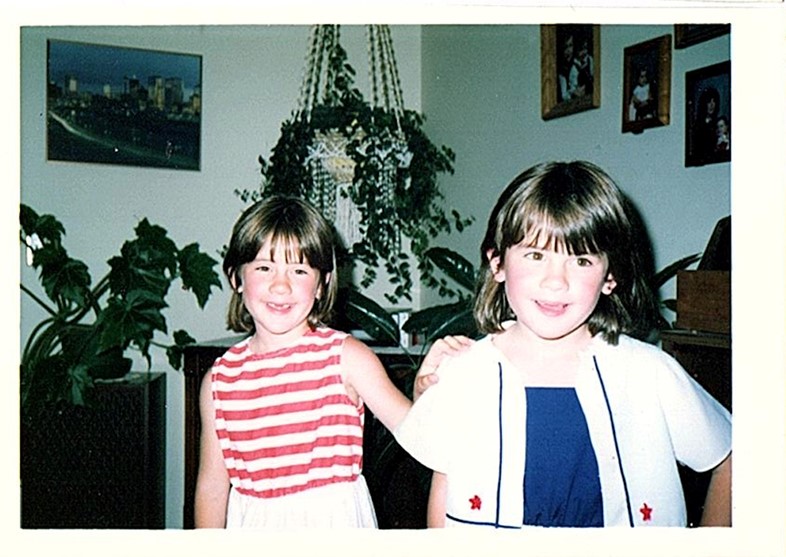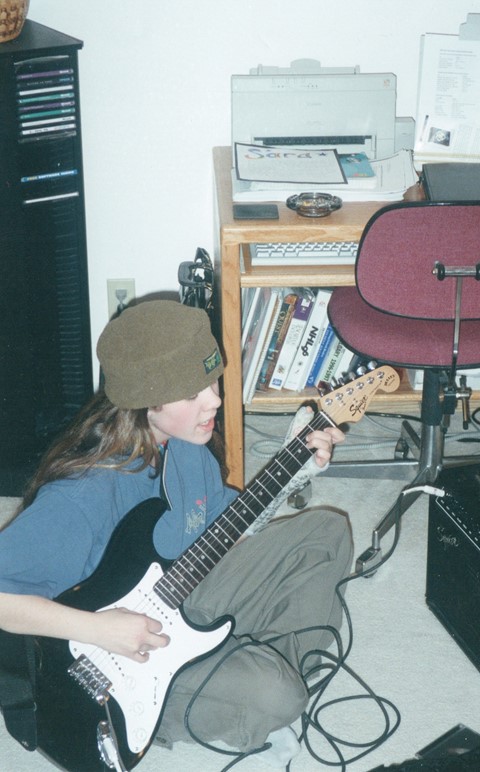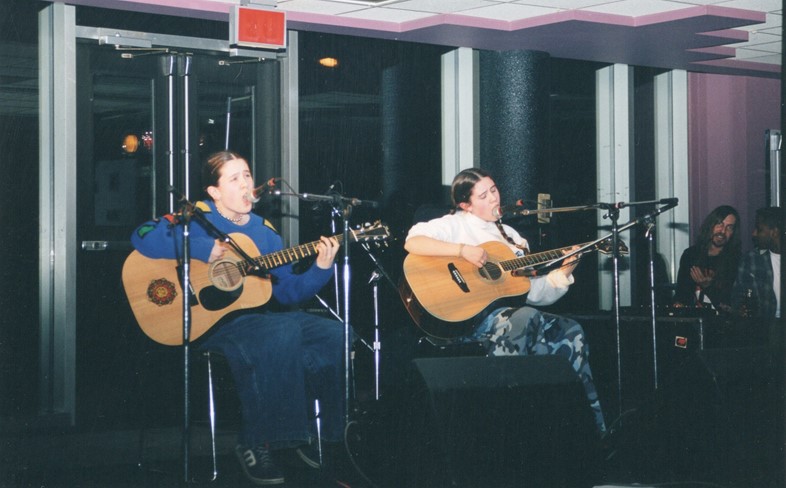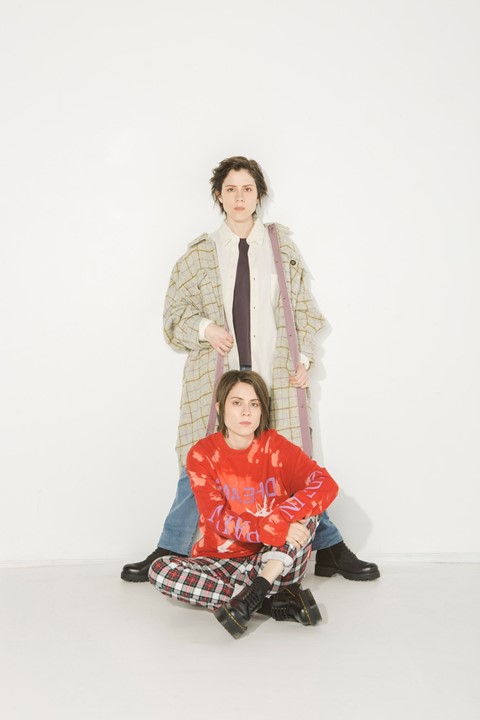With a memoir and album about to drop, Sara Quin of Canadian indie pop band Tegan and Sara opens up about her youth and about the complicated emotions she experienced while working on these projects
Tegan and Sara aren’t scared of musical evolution. The Canadian twin sisters have always written super-catchy songs, but over the years their early indie-pop sound has blossomed into something glossier and more electronic: for their last two albums, 2013’s Heartthrob and 2016’s Love You to Death, they collaborated with Adele-producer Greg Kurstin; Closer, a joyous head-rush of a club banger, was even featured on Glee.
As their profile has grown, the Quin sisters have also established themselves as significant queer voices in the music industry. In 2016, they launched the Tegan and Sara Foundation with the stated aim of ‘fighting for health, economic justice and representation for LGBTQ girls and women’.
Now, 20 years after they released debut album Under Feet Like Ours, Tegan and Sara are allowing themselves to reflect on their personal evolution. Their excellent new memoir High School offers a moving and revealing glance back at the sisters’ formative years making music, going to raves and slowly getting to grips with their gayness. Alongside the book, they’ve re-recorded a variety of unreleased demos they made as teenagers for their new album, Hey, I’m Just Like You, a cute fusion of their musical past and present.
With both the book and album about to drop, I spoke to Sara Quin about the complicated and sometimes painful emotions she experienced while working on these projects.
Nick Levine: What did you learn about your teenage self from writing this memoir?
Sara Quin: I think by the time we were finishing the memoir, I had such admiration for myself as a teenager. I was brave. I went out every day looking how I wanted to look even though people laughed at us – they said we dressed like garbage and that we were ugly. But we put those clothes on every single day and looked in the mirror and thought ‘we look so fucking cool’. And I have such admiration for that person who did that and found other people who dressed like that and other communities who supported those ideas. Because the clothes weren’t just clothes; they were about the kind of people we wanted to be and the kind of people we wanted to spend time with. Do I want to dress like that now? No! But to look back and have love and affection for that version of myself is a very empowering thing.

NL: In the book you and Tegan write so movingly about getting to grips with your sexuality – with being queer. And it was very much a process, wasn’t it?
SQ: You know, we talk about this a lot. Even when I had a girlfriend and I was having sex with her, I still imagined myself as being not gay. There was a layer of distance that I afforded myself so that I wouldn’t have to deal with it. It’s striking to me now because looking back, I’m like, ‘Wow, I was really gay!’ And it wasn’t like I wasn’t talking about gay people. Tegan and I found 20 hours of VHS tapes from our broadcast and communication class [at high school] and any time we were on camera, we’d find a way of working into the conversation, like, ‘What do you think about homosexuals?’ So it was weird to be writing this book about how scared I was as a young queer person – and then see all these VHS tapes where I never shut up about gay people. That’s how deep the denial was. I could talk about gay people and not associate myself with it.
NL: Were you in denial about Tegan’s queerness too?
SQ: Oh, I wasn’t thinking Tegan was straight. I just didn’t know how to talk about it with her. I imagined that Tegan was also having feelings for girls, though I didn’t have proof until we were in grade 12 that Tegan was sleeping with a girl. I was just like: ‘Oh, Tegan is doing exactly what I’m doing, Tegan feels the same things I’m feeling.’ I think I made that assumption because she had similar behaviours to me. When girls were supposed to be obsessed with their boyfriends, we had best friends who were we obsessed with.

NL: Did it make it any easier on some level, knowing that your sister was experiencing the same thing?
SQ: Oh no, it made it worse for me. Because the thing I was trying to keep secret inside of myself, she was like an externalised version of. How do I say this? I didn’t want her to be gay because I felt like that was going to make me seem more gay. When I felt like it was only me having these feelings, it made me feel isolated, but it was still my thing – something that was happening to me, and not to both of us. So when I figured out she was sleeping with her best friend, it wasn’t like, ‘Yay, we have this thing in common, I can’t wait to talk about it’. I was like, ‘Oh great, so we’re both gay’.
NL: When you were writing the book, were you shocked at how scared of your own queerness you were during this time?
SQ: I don’t know if I was shocked, but I was really sad when I was going through that part of my story and thinking how impacted by my internalised homophobia I really was. We sort of brush it off now – like, ‘yeah, things weren’t as cool for gay people back in the 90s’. But I spent a year writing about this and I felt grief and anger and I felt like, God, no wonder I had so much internalised homophobia – the only time I ever heard about gay people was on talk shows and it was always stories about them being exploited or murdered or assaulted. So I sort of grieved for this younger version of myself that could have known something different.

NL: Before the internet, it wasn’t so easy to find those positive stories about gay people.
SQ: Exactly. And later, as a young person in my twenties, I learned about queer history and Aids and Act Up and all these inspiring fucking amazing people – people who had always existed and trailblazed and made things easier. So when I went back to looking at high school, I was like, ‘Geez, what would it have meant to me to have had that knowledge as an adolescent? Maybe I wouldn’t have felt so ashamed or so alone?’ In some ways that ties into our music career because when we first started playing music we were so isolated. We felt as though we didn’t have a ‘scene’ or mentors who could take us under their wing. And I think as a result, as Tegan and I started to get more successful, we tried to create the community that hadn’t existed for ourselves. Because we knew how important that community was and how it can help you get through the bullshit. And there’s so much bullshit!
NL: I think the resilience you and sister show in the book will be so incredible to a lot of people reading.
SQ: Yeah, I hope so. And I think one of the things that really came out of writing the book is that I did grapple with this narrative that I’d been telling myself, and I did think, ‘I’m gonna give myself a new narrative to chew on’. Through writing the book I realised, you know what, I want to let go of some of this. I didn’t realise I was holding on to a lot of this stuff, but I was. Because the truth is, I did experience that trauma and I did suffer a lot as a teenager, but I did grow up and become someone who’s very confident and very happy. And I did become someone who built a community that now gives me so much strength and pride. So I’ve also tried to use this experience to try and move forward. People will say, ‘Oh, you’re so lucky because you had this great group of friends and your twin sister’. But whenever it is that you’re able to develop that community, it’s so important to do it. Whether you’re a teenager or an adult, finding people that love and accept you is everything.
Tegan and Sara’s memoir High School is out now. The album Hey, I’m Just Like You follows on September 27, 2019.
